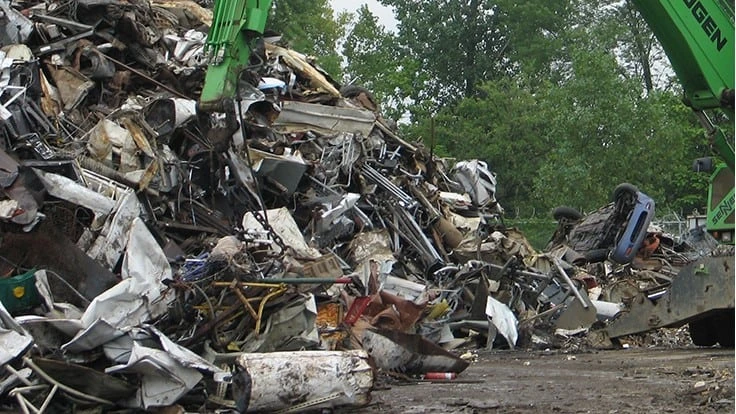
Photo by Brian Taylor.
In Chicago and suburban Boston, people and groups with “not in my back yard (NIMBY)” opposition to scrap processors are reviving their complaints and citing the COVID-19 epidemic as the reason.
On the north side of Chicago, residents in a gentrifying neighborhood have long had General Iron Industries in their crosshairs as an unwelcome neighbor. In March and April, more time at home for some residents seems to have revived the long-simmering opposition to the scrap company.
A March 31 Chicago Tribune online article portrays some General Iron neighbors as being “livid” that the scrap company has continued to operate during the epidemic. The article says a Lincoln Park neighborhood resident named Lara Compton, who is part of a group called Clean The North Branch, has written to the governor of Illinois to complain about perceived air pollution emanating from General Iron.
The article notes that both state and city regulators have given the green light to recycling as an essential business during the epidemic. It also quotes from a March 24 letter from Steve Joseph, CEO of General Iron’s owner, Stow, Ohio-based Reserve Management Group, written to Chicago’s assistant health commissioner.
In that letter, Joseph writes in part that General Iron’s “products are necessary raw materials used by steel manufacturers and iron and nonferrous foundries in the production of all manner of metal goods.”
The article also portrays General Iron as “one of the last industries on a stretch of the Chicago River” in two neighborhoods—Lincoln Park and Bucktown—that have seen rapid residential and retail redevelopment and gentrification.
The Zillow website shows three- and four-bedroom homes in the Clybourn Avenue corridor near General Iron as being listed from $800,000 to $1.5 million.
The Reserve Management Group is in the process of relocating some of General Iron’s operations from that north side neighborhood to another General Iron location on Chicago’s south side.
In Somerset, Massachusetts, near Boston, a selectman (similar to city council representatives in other jurisdictions) is unhappy with noise emanating from a scrap metal operation near where he lives and has asked government agencies to deem the business non-essential during the COVID-19 epidemic.
An April 1 online article by South Coast Today says Selectman Steven Moniz used a town meeting to air a noise complaint about a scrap metal ship loading operation at the Brayton Point Commerce Center near his home.
Moniz reportedly said at the meeting that shipping scrap metal is not one of the essential businesses designated by the Massachusetts governor as being allowed to operate during the coronavirus epidemic. He also reportedly said he is “concerned about the safety, health and welfare of the whole town,” according to South Coast Today.
Another Selectman, named Holly McNamara, defended the scrap metal operation and said noise had been measured at the site at “different times” and was found to be at a level “well below a normal conversation.”
McNamara reportedly said she also is “very concerned” about the health and welfare of people in town, but said Moniz’s comments “were not adding up.” She said she was unwilling to shut down the business without first consulting with other local and state government agencies, according to the article.
The South Coast Today article does not mention the name of the scrap company, but other media reports from October and November 2019 refer to an EMR Ltd. operation at Brayton Point Commerce Center that was receiving noise complaints during that time frame.
The Washington-based Institute of Scrap Recycling Industries (ISRI) and the Arlington, Virginia-based National Waste & Recycling Association (NWRA) have lobbied extensively to ensure recycling is specifically recognized as an essential industry by the federal and state governments.
According to ISRI, the federal Department of Homeland Security has updated its “Guidance on the Essential Critical Infrastructure Workforce: Ensuring Community and National Resilience in COVID-19 Response” to include recyclers, although as of March 25 the words “recyclers” or “recycling” were not specifically mentioned in the document.
ISRI also has petitioned the Federal Motor Carrier Safety Administration (FMCSA) to add the transporting of ferrous and nonferrous metals to join paper and plastic materials as being deemed essential, transportable feedstock for manufacturing essential supplies and equipment during the COVID-19 outbreak.
Latest from Recycling Today
- Reconomy brands receive platinum ratings from EcoVadis
- Sortera Technologies ‘owning and operating’ aluminum sorting solutions
- IDTechEx sees electric-powered construction equipment growth
- Global steel output recedes in November
- Fitch Ratings sees reasons for steel optimism in 2025
- P+PB adds new board members
- BlueScope, BHP & Rio Tinto select site for electric smelting furnace pilot plant
- Magnomer joins Canada Plastics Pact





